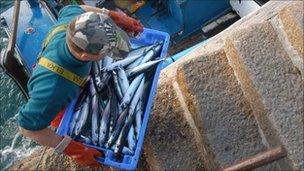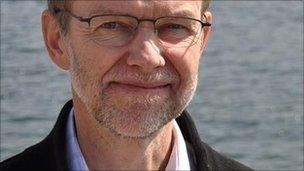Science 'cannot address' mackerel row says ecologist
- Published

Quotas on mackerel catches has sparked an international row
Governments, not scientists, will have to tackle the row over mackerel quotas, according to a leading adviser on the Common Fisheries Policy.
Poul Degnbol, head of the advisory programme at the International Council for the Exploration of the Sea (Ices), is to give a talk in Argyll this week.
His lecture will be delivered amid a row between Scotland and the Faroes and Iceland over mackerel quotas.
Mr Degnbol said the parties do not question Ices' scientific advice.
On Monday, fishermen, angry at increased Faroes and Iceland mackerel quotas, vowed to continue to blockade boats trying to land their catch in Scotland.
The pledge came after a meeting in Fraserburgh organised by the Scottish Pelagic Fishermen's Association and Scottish Fishermen's Federation.
It is claimed the quotas threaten stocks as well as the Scottish fleet.
Denmark-based ecologist Mr Degnbol told the BBC Scotland News website: "The mackerel row is not a scientific issue - none of the parties involved question the scientific advice given by Ices.
"It is all about getting a working arrangement to share the access to the resource between different fleets, or countries, so that the fisheries overall is sustainable.
"Obviously, when the total of the quotas set by different parties exceeds what is considered sustainable, the overall mackerel fishery cannot be sustainable, but this is independent of who is taking the fish."

Ecologist Poul Degnbol will deliver the annual UHI lecture
He added: "The sharing between countries and the task to set up a process where the sharing is done in a responsible way is a policy issue to be addressed by the governments involved, not by science."
Mr Degnbol will deliver the prospective University of the Highlands and Islands (UHI) annual lecture at the Scottish Association for Marine Science UHI in Dunstaffnage, near Oban, on Thursday.
He said it would deal with the management of marine ecosystems with an emphasis on fisheries.
The ecologist will discuss the performance of the Common Fisheries Policy and possible ways to improve it.
Mr Degnbol recently won the World Wild Fund for Nature's Baltic Sea Leadership Award 2010 for his European Union work on sustainable fisheries.
- Published13 September 2010
- Published24 August 2010